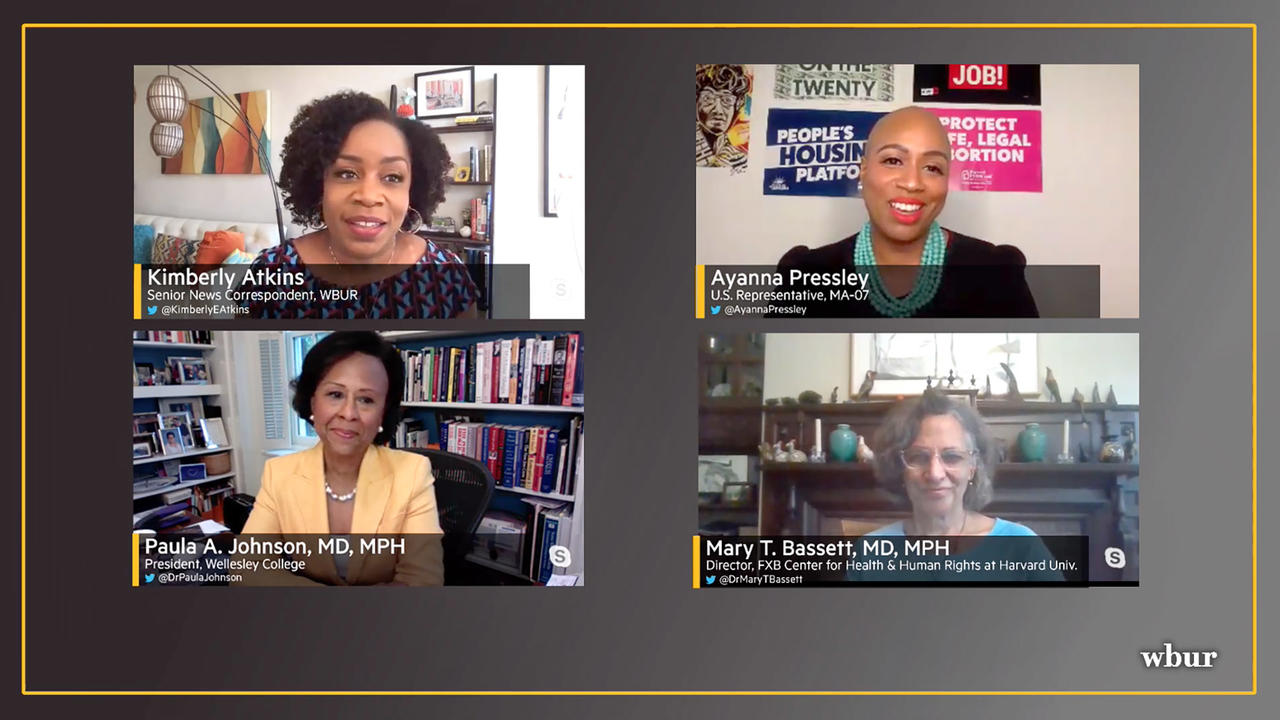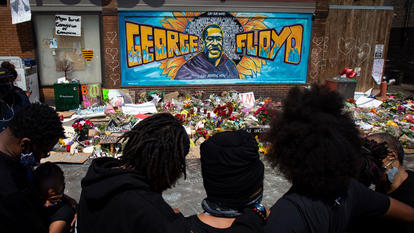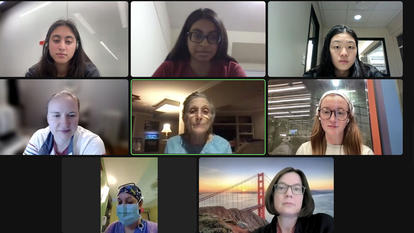
President Paula Johnson Joins WBUR Town Hall on Racial Inequities Revealed by COVID-19
On June 9, Wellesley President Paula Johnson joined U.S. Rep. Ayanna Pressley and Dr. Mary Travis Bassett, director of the François-Xavier Bagnoud Center for Health and Human Rights at Harvard and professor at the Harvard T.H. Chan School of Public Health, for a WBUR digital town hall to discuss the racial inequities revealed by the COVID-19 pandemic in the United States. Hosted by Kimberly Atkins, senior news correspondent, the conversation was part of a broader series launched by WBUR this spring.
Johnson, Pressley, and Bassett discussed why people of color are dying of the virus at disproportionate and devastating rates, the process of data collection during this pandemic, and how to address the underlying structural causes of the racial disparity in health outcomes. Atkins took questions from the Boston-area audience.
Johnson, a cardiologist who worked to change policy to include information on sex differences in medical research to uncover gender bias, opened the town hall with an explanation of the role of data in understanding and combating the pandemic. “Data are critical because if we don’t have the right data, we can’t measure or know exactly where to target our prevention, our therapies, and any intervention,” she said. “What we know from this pandemic is that we really have had inadequate data from the very beginning.”
Johnson pointed out that nearly half of the race data on the pandemic is missing in cases reported by the federal government. “The CDC really just mandated the collection of race data constantly only about a week ago,” she said. “It’s important to get the whole story, not just even in the silos, but to understand, for example, how we intersect race and ethnicity with sex.”
Bassett spoke to the importance of contextualizing data, once it is successfully collected, to combat the disparities in outcomes. She also explained how to spot poor interpretations of data. “Having the data doesn’t guarantee that it will be interpreted in a way that isn’t racist, frankly,” she said. Racist interpretations, she explained, “typically place the problem with the person, rather than talking about the environment in which people live.”
“We are part of the United States, and therefore, of course there is structural racism in our institutions ... we have to take responsibility, particularly as scientists, and as people in the medical field, to rigorously examine what those roots are, and how we get to the bottom of it.”
President Paula A. Johnson
She urged people not to seek individualistic explanations for the differences in coronavirus infection and death rates across communities, rather than structural explanations. “We have to look at the environments that have made it a fact that the legacy of this country’s treatment of people of African descent is literally written on our bodies,” she said.
Pressley said disaggregated, publicly reported race data on coronavirus cases can help cities direct resources, ameliorate outbreaks, and ensure an equitable public health response, citing Massachusetts as one of the more effective states in this regard. “Massachusetts was a leader, and one of the first three states to begin collecting and reporting racial data, and it directly informed what our response was in Chelsea, and how resources were marshaled in Roxbury, Mattapan, Dorchester, and later in Randolph,” she said.
The lack of consistent collection and dissemination of race data during this pandemic has hampered the public health response, the panelists said, and this issue is not new. “This has been a pervasive problem in medicine and science for years,” said Johnson. “Many of us have been struggling and really working to have our research community routinely report data by gender and race and disaggregate the data. There is no consistent approach, which really hurts our communities of color in so many ways, and does not allow them to get the benefit of all that we’ve invested.”
When the discussion turned to ways communities of color struggle to access health care more generally, Pressley asked Johnson about what leads to Black patients’ health complaints and problems being delegitimized in health care settings. Earlier, Johnson had brought up the death of Rana Zoe Mungin ’11, who was repeatedly turned away when she attempted to seek testing and care for COVID-19.
“I think we just have not gotten serious about this,” Johnson said. “We have not taken a scientific, rigorous approach to structural racism in our health care environment, we have not rigorously looked at it, and we have not rigorously examined ourselves and the structures. What we should say is we are part of the United States, and therefore, of course there is structural racism in our institutions, and therefore we have to take responsibility, particularly as scientists, and as people in the medical field, to rigorously examine what those roots are, and how we get to the bottom of it, but we have yet really to do that.”
Near the end of the discussion, Atkins steered the conversation toward possible solutions to the structural problems and health care disparities the pandemic has exposed.
“We have not taken seriously the evaluation of what it means to try to tear down structural racism in our medical system, in our institutions, institution by institution,” said Johnson. “We live in what some call the medical mecca of the United States, but to say that we have taken this on as a major initiative, as a major cause across our institutions? That has not happened. And I think that is what it’s going to take in order for us to really understand some of the deep-rooted structures that need to be dismantled.”
“This has been a bad run for the status of public health,” said Bassett. However, she said the protests across the country in the wake of George Floyd’s death have given her hope. “I have worked in public health for over 30 years, and I haven’t seen this type of mass mobilization saying that this has been centuries in the making, and it has to stop,” she said. “These disparities were made by people, and they can be fixed by people.”
Pressley said new legislation must address the disparities. “This hurt was precise and it was targeted through discriminatory and draconian lawmaking,” she said. “If we can legislate disproportionate hate, hurt, and harm onto communities of color, we can also legislate healing and justice.”
Johnson closed by referring to the AIDS crisis: It devastated the LGBT community, but it deeply affected minority populations as well. “We forget that,” she said. “This time, lets not let that happen again. Let’s not waste this crisis.”



